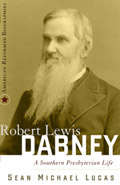
Sean Michael Lucas
Reviewed by: T. David Gordon
Robert Lewis Dabney: A Southern Presbyterian Life, by Sean Michael Lucas. Published by P&R, 2005. Hardback, 295 pages, list price $24.99. Reviewed by Prof. T. David Gordon of Grove City College.
The editors of the American Reformed Biographies series have wisely published this volume as the first in the series. Dr. Lucas has written an interesting, articulate, readable biography. He deftly handles both primary and secondary sources in a narrative that manages to restrain itself to 295 rich pages.
Lucas has provided us with the first critical biography of the most eminent Southern Presbyterian theologian. Consistent with the advice on Dabney's tombstone to "Prove all things; hold fast that which is good," Lucas not only locates Dabney within his cultural and intellectual context, but presents him, with considerable justification, as "a representative Southern conservative" (p. 17, emphasis added). Specifically, Lucas demonstrates the formative influence of Scottish Common Sense philosophy (pp. 29, 81ff., 219), the Old Republicanism of John Randolph and John C. Calhoun (pp. 23, 25, 29-30), and the Southern idea of honor (pp. 32-34, 101-104), in addition to the more obvious influence of Old School Presbyterianism. Throughout, Lucas presents Dabney in the Southern stream of early American antimodernism (pp. 18, 190,232, 243). This provides unity to the many details of the literary portrait.
Lucas provides the details in alliterative chapters on Dabney's "Preparation," his life and work as a "Pastor," his labors as a "Professor," his work as a "Patriot", and his endeavors as a "Presbyterian Partisan" and a "Public Theologian," before concluding with a chapter on his "Passing" and another affording "Perspective."
Previous commentators on Dabney's life have either demonized him or canonized him. But Lucas manages to avoid either extreme. He rightly recognizes that Dabney's doctrine of the spirituality of the church was a genuine ecclesiological and intellectual commitment, not merely an expedient devised to evade antislavery arguments (pp. 93-94, 112ff., 243-244, contra, e.g., E. T. Thompson and Jack P. Maddex, Jr). Lucas accurately presents Dabney's own proslavery arguments while exposing the pervasive racism that infected and therefore undercut the cogency of those arguments (pp. 135,143-144). He demonstrates some convincing similarities between Dabney and Abraham Kuyper (their antimodernism, antistatism and respect for the family as the primary social institution), while also acknowledging some areas of difference (e.g., Kuyper's tendency toward a transformationist understanding of Christianity's relation to culture, pp. 231, 239,240-241).
Every good biographer will include one or two eccentric strokes in his portrait, to challenge his audience to consider a slightly altered perspective. Lucas does this in an intriguing, if not altogether convincing, discussion of Dabney's relation to military life. While noting that Dabney did not enlist to fight, but later served (somewhat ineptly) as an aide to Stonewall Jackson, Lucas suggests that there was a psychological conflict within Dabney. He resisted the call to military glory and could only reconcile this conflict by writing a paean to Jackson, by which Dabney was able "to rationalize his avoidance of the war and reclaim his manly honor" (p. 129).
To his credit, Lucas will create a few enemies by this volume. Dabney's most ardent followers will object to a portrait that demystifies him; his most ardent critics will object to one that humanizes him. Yet, because of Dabney's position as a representative Southern conservative, any truthful account of him will elicit this polarized response. That Lucas will receive some unmerited criticism from both poles is a testament to his competence as an historian. If the remainder of the series on American Reformed Biographies measures up to the standard set by Lucas, its readers will find themselves both gratified and edified.
December 28, 2025
December 21, 2025
December 14, 2025
December 07, 2025
November 30, 2025
November 23, 2025
November 16, 2025
© 2026 The Orthodox Presbyterian Church